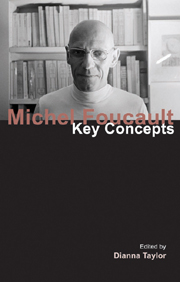4 - Power/knowledge
from PART I - POWER
Summary
Foucault explicitly introduces the composite term, “power/knowledge” (pouvoir/savoir) in the middle, “genealogical” period of his work. At the same time, however, the concept of power/knowledge in many ways encompasses the entire corpus, characterizing the implicit project of his “archaeological” works, the explicit focus of the “genealogical”, and the working out of the implications for living a good life in the later “ethical” work.
To understand what Foucault means by power/knowledge we first have to engage in a little translation. Notice that when the term is used in philosophy written in English, the original French in which Foucault spoke and wrote often follows it. In French, there are different ways of expressing distinctive categories of knowledge which English speakers mark by qualifications such as “folk knowledge” or “book knowledge”. In many of his earlier, archaeological works, Foucault is interested in investigating how a particular kind of implicit knowledge – the savoir – permeating a historical period, that is, the understanding that counts as the “common sense” of that time/place/people, shapes the explicit knowledge – the connaissance – that is institutionalized in the disciplines that make up the human sciences, including natural (e.g. biology) or social (e.g. psychology) science (Foucault 1972: 182–3).
As a noun, pouvoir is most typically translated as “power”, but it is also the infinitive form of the verb meaning “to be able to”, and is the most common way of saying “can” in Romance languages.
- Type
- Chapter
- Information
- Michel FoucaultKey Concepts, pp. 55 - 68Publisher: Acumen PublishingPrint publication year: 2010
- 1
- Cited by

